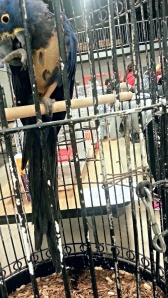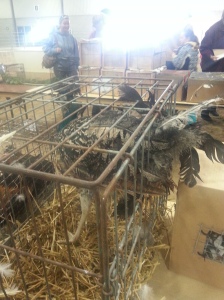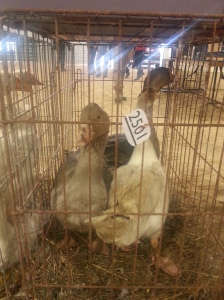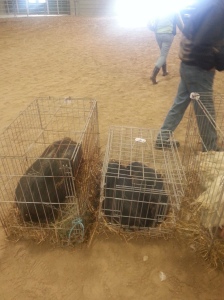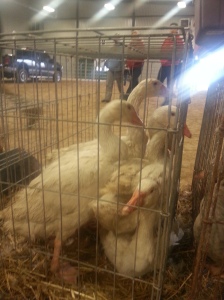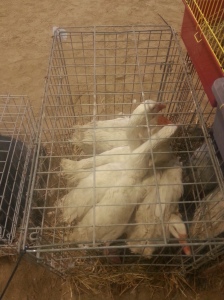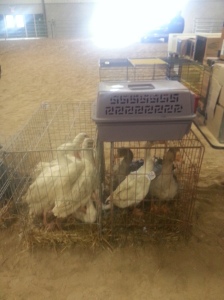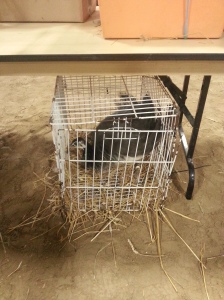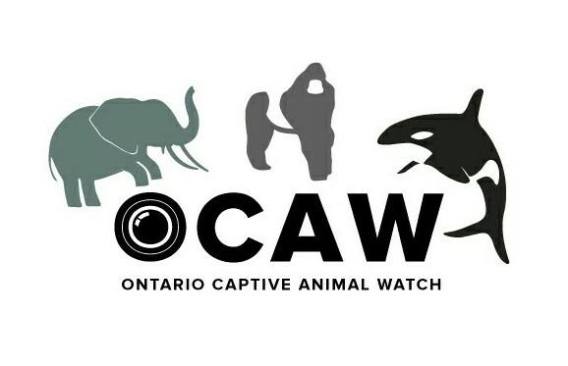Do you have five dollars to spare? If so, then you can get into the Tiger Paw Exotic Animal auction – I paid in change. The auction took place at the Orangeville Fairgrounds this year. I went with a newly founded animal welfare organization called Ontario Captive Animal Watch (OCAW), which I’m a member of.
On the premises, you can find exotic animals in the “warm room” for viewing, and you can find hoofstock in the back of the building in pens. Yesterday – May 3, you could see a variety of miniature ponies, donkeys, and llamas, as well as two zebras, a very young, lone bison, and 700, a pygmy goat kid in need of immediate veterinary care. This is a story about 700, who became more than just a number when we showed him love he’s presumably never received.
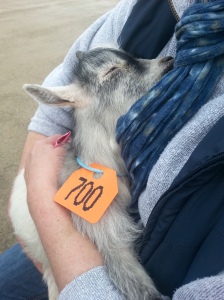
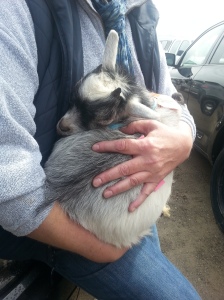
We arrived early and observed the conditions for a few hours – stealthily photographing what we saw while biting our tongues. The conditions were abhorrent: many cages were too small and overcrowded, there were young animals who had been separated from their mothers too early, as well as injured, miserable, and generally stressed out animals. Among them was 700 – he was bloated, shaking, and malnourished. He was penned with a sheep and an unaltered male goat who would continuously head-butt the young goat, causing him to topple over. He was lethargic, sick, and needed emergency care as soon as possible.
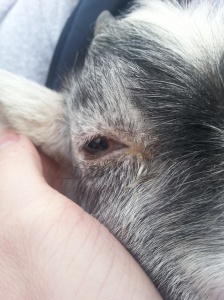
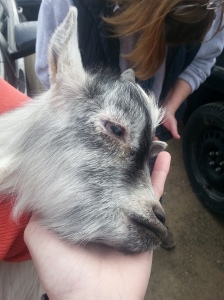
A woman, who we will call Jane for the sake of anonymity, joined us in our observation of the market. She played a large role in 700’s story and how it unfolds. After observing 700 and the horrible state of an endangered hyacinth macaw (photo below), Jane contacted the Ontario Ministry of Agriculture, Food and Rural Affairs (OMAFRA). The OSPCA was contacted as well but no animal cruelty investigator was available to inspect the auction (they have no agents on duty or on-call during the weekends or after business hours).
An OMAFRA investigator was sent to inspect the conditions officially and, according to her, this year’s auction was significantly worse than last year’s. I ended up losing track of the investigator and she doesn’t show up until the end of the story.
After Jane spoke with Tiger Paw owner Tim Height regarding the severity of 700’s health, he actually agreed to give the goat to us so we could get him help (at our expense). Height found us a box large enough for the goat and we made our way out of the building. We needed to act quickly as it was apparent that 700’s health was steadily declining – he could hardly stand at this point. He was fragile and too weak to hold his head up. His eyes were gradually closing – his body was exhausted from exerting energy all day.
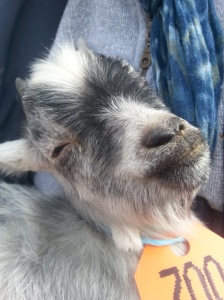
700 was vulnerable and was now in our hands. As he laid in one of our laps, wrapped in a blanket, we were on our phones trying to contact available veterinarians and people with farms who were able to take him in. While we were on our phones and waiting for saviours to return our messages, we were comforting the young goat as well. We were sure he wasn’t going to make it if we didn’t find help soon. It was apparent that he was slowly fading; that he was slowly letting go. That this 700 would soon be zero, much to our despair. That wasn’t going to happen though – not without a fight.
After waiting anxiously to find hope for dear 700, we finally had a breakthrough: the Town and Country Animal Hospital in Stouffville managed to squeeze us into their busy day. As we shared the sigh of relief with Jane, she informed us that OMAFRA had contacted her and said that if we leave the premises with 700 then we will be charged with theft. According to OMAFRA, we had stolen the goat. That’s when things started coming together. That’s when the emotion truly hit.
We have an ailing, lethargic goat in our lap who we’ve just found hope for: hope revoked. You can imagine our frustration when we realize we may have just been set-up. That somebody was possibly watching us in this very moment. That they had slyly followed us to our vehicles and took a photo of our license plates. We can’t take 700 to the vet or else we will get charged. We couldn’t even try because they would stop us before we could even get him the help he needs.
OMAFRA had sent a vet the fairgrounds at the request of Jane. The investigator and vet were inside searching for us. We informed them of our location over the phone and I went to collect them from the front entrance of the auction. As I was walking them to the goat, they interrogated me as if I was the criminal in this situation: “You have violated a very serious law – this is a very serious offence.”
Tim Heights gave the goat to us. He literally handed 700 to us, commended us for our willingness to help, and found us a box. I told the investigator this and she informed me that what he did was illegal too – maybe he knew that, maybe he didn’t.
“Once the animal has been segregated, it is illegal to remove it from the premises,” the investigator said.
“Good thing we didn’t leave the premises then so, I don’t care,” I said. “Can we help this goat now please?”
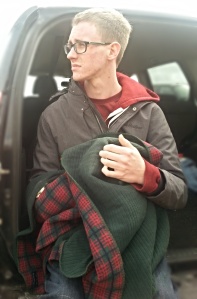
Nicholas Wilvert, Co-founder of Ontario Captive Animal Watch holding 700 (under the blanket).
After a few questions from the vet regarding the goat’s condition, they took him from our arms and back into the building. According to them, it is up to the owner as to how the vet is to proceed with 700. They would either have him treated or euthanised. The owners were not allowed to sell him in the auction because he simply wasn’t transportable, they said.
We were sure that 700 was most likely going to be euthanised but, by a twist of fate, the goat was put on fluids instead as per the seller’s request. After receiving fluids, 700’s health began to stabilize. Though it was a relief to hear the news of the care he did end up receiving, we are still greatly uncertain of what 700’s fate will actually be. Perhaps he will be continue to be viewed as just another number but ideally, someone will take him home and he will receive love.
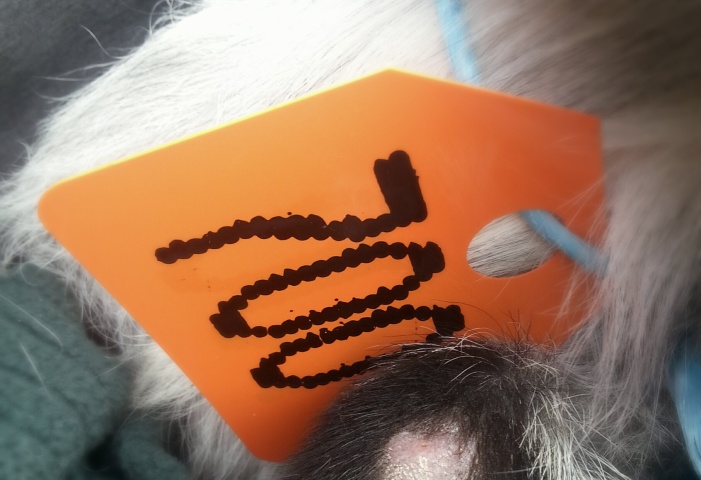
700 was not just a number; 700 will never be just a number.
